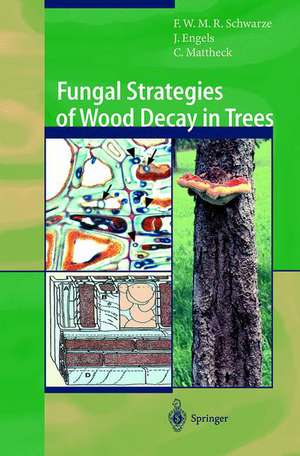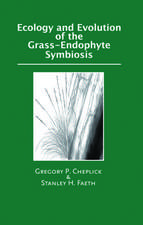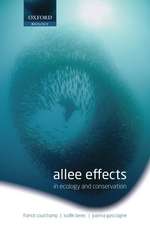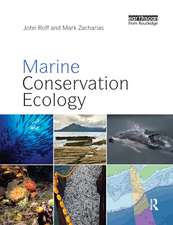Fungal Strategies of Wood Decay in Trees
Autor Francis W.M.R. Schwarze Traducere de W. Linnard Autor Julia Engels, Claus Matthecken Limba Engleză Hardback – 4 aug 2000
| Toate formatele și edițiile | Preț | Express |
|---|---|---|
| Paperback (1) | 771.33 lei 6-8 săpt. | |
| Springer Berlin, Heidelberg – noi 2012 | 771.33 lei 6-8 săpt. | |
| Hardback (1) | 1051.19 lei 6-8 săpt. | |
| Springer Verlag – 4 aug 2000 | 1051.19 lei 6-8 săpt. |
Preț: 1051.19 lei
Preț vechi: 1281.93 lei
-18% Nou
Puncte Express: 1577
Preț estimativ în valută:
201.14€ • 210.01$ • 166.47£
201.14€ • 210.01$ • 166.47£
Carte tipărită la comandă
Livrare economică 05-19 aprilie
Preluare comenzi: 021 569.72.76
Specificații
ISBN-13: 9783540672050
ISBN-10: 3540672052
Pagini: 185
Ilustrații: XV, 185 p. 65 illus., 35 illus. in color.
Dimensiuni: 155 x 235 x 14 mm
Greutate: 0.51 kg
Ediția:2000
Editura: Springer Verlag
Colecția Springer
Locul publicării:Berlin, Heidelberg, Germany
ISBN-10: 3540672052
Pagini: 185
Ilustrații: XV, 185 p. 65 illus., 35 illus. in color.
Dimensiuni: 155 x 235 x 14 mm
Greutate: 0.51 kg
Ediția:2000
Editura: Springer Verlag
Colecția Springer
Locul publicării:Berlin, Heidelberg, Germany
Public țintă
Professional/practitionerCuprins
1 Introduction.- 2 Fundamental Aspects.- Wood Anatomy.- Mechanical Model for Wood.- Types of Wood Decay.- 3 Examination, Importance and Mechanical Effects of Wood-Decay Fungi in the Living Trees.- Fungus Identification.- Fungus-Host Combinations.- 4 Host-Fungus Interactions: Development and Prognosis of Wood Decay in the Sapwood.- The CODIT Model.- Host Response Mechanisms in the Sapwood.- Different Response Mechanisms in Heartwood and Sapwood.- The Importance of Walls 1-3 from the Mycological Standpoint.- Example of Strong Compartmentalization of Ustulina deusta in a Healthy Beech Tree.- Examples of Weak Compartmentalization of Ustulina deusta in a Weakened Beech Tree.- Ustulina deusta in Lime Trees.- The Behavior of Strong and Weak Compartmentalizers in the Host-Fungus Interaction.- Xylem Rays as the Tree’s Achilles Heel in Host-Fungus Interactions.- Cracks as’ Motorways’ for Fungi.- The Importance of the Barrier Zone (Wall 4).- Postscript.- References.
Recenzii
From the reviews
" ... The illustrations are superb, and combine specially-drawn three dimensional interpretative diagrams of wood cellular anatomy with annotated colour micrographs. The science is up to date, with an excellent select bibliography. ... the authors have produced an excellent and innovative book and I would strongly recommend it for individual purchase by all involved in decisions about urban tree preservation, as well as researchers and teachers in mycology and plant pathology." (Mycological Research, UK)
"... The book is extremely well illustrated with 63 figures, many with multiple images and in color. .... this book is a nice compact compendium of selected fungi that invade living tres that would most benefit the arborist seeking to learn a bit more about the fungit that attack shade trees." (Mycopathologia 2001, Vol. 154)
" ... The illustrations are superb, and combine specially-drawn three dimensional interpretative diagrams of wood cellular anatomy with annotated colour micrographs. The science is up to date, with an excellent select bibliography. ... the authors have produced an excellent and innovative book and I would strongly recommend it for individual purchase by all involved in decisions about urban tree preservation, as well as researchers and teachers in mycology and plant pathology." (Mycological Research, UK)
"... The book is extremely well illustrated with 63 figures, many with multiple images and in color. .... this book is a nice compact compendium of selected fungi that invade living tres that would most benefit the arborist seeking to learn a bit more about the fungit that attack shade trees." (Mycopathologia 2001, Vol. 154)
Textul de pe ultima copertă
Wood-destroying fungi play an important role in nature, because they are the only forms of life capable of reducing wood to its initial constituents. However, they can also be dangerous for people and property, as they can impair the stability and fracture-safety of trees.
This book gives detailed information, based on new and original scientfic findings, on the examination and effects of the most important species of fungi associated with failure of infected urban trees. In addition, new ways are presented for predicting the advance of decay in the living tree. The subject is illustrated and made easily accessible by numerous colored photos of fungus fruit bodies, defect symptoms, and macroscopic and microscopic pictures of wood decay. A detailed introduction to the fundamentals of wood pathology provides a way into the subjects of applied mycology and tree care for readers without previous special knowledge. Francis W.M.R. Schwarze, National Diploma of Arboriculture at Merrist Wood College, UK (1991), Master of Science in Pure, Applied Plant and Fungal Taxonomy, University of Reading, UK (1992), doctorate at Freiburg University (1995), since 1996 assistant at the Institute for Forest Botany and Tree Physiology at Freiburg University, concentrating on research into wood-destroying fungi and host-fungus interactions.
Julia Engels, Diploma Forester at Freiburg University (1995), doctorate on root fungi at Freiburg University (1998). Since 1998 active in tree care and mycology in Luxembourg.
Claus Mattheck, born 1947, doctorate in theoretical physics (1973), qualified as lecturer on damage studies at Karlsruhe University (1985), and now teaches there as Professor. Since 1991 he has been an officially appointed and attested expert on tree mechanics and fracture behaviour. Has been awarded numerous prizes for research and publication. Head of the Biomechanics Department at the Karlsruhe Research Centre.
This book gives detailed information, based on new and original scientfic findings, on the examination and effects of the most important species of fungi associated with failure of infected urban trees. In addition, new ways are presented for predicting the advance of decay in the living tree. The subject is illustrated and made easily accessible by numerous colored photos of fungus fruit bodies, defect symptoms, and macroscopic and microscopic pictures of wood decay. A detailed introduction to the fundamentals of wood pathology provides a way into the subjects of applied mycology and tree care for readers without previous special knowledge. Francis W.M.R. Schwarze, National Diploma of Arboriculture at Merrist Wood College, UK (1991), Master of Science in Pure, Applied Plant and Fungal Taxonomy, University of Reading, UK (1992), doctorate at Freiburg University (1995), since 1996 assistant at the Institute for Forest Botany and Tree Physiology at Freiburg University, concentrating on research into wood-destroying fungi and host-fungus interactions.
Julia Engels, Diploma Forester at Freiburg University (1995), doctorate on root fungi at Freiburg University (1998). Since 1998 active in tree care and mycology in Luxembourg.
Claus Mattheck, born 1947, doctorate in theoretical physics (1973), qualified as lecturer on damage studies at Karlsruhe University (1985), and now teaches there as Professor. Since 1991 he has been an officially appointed and attested expert on tree mechanics and fracture behaviour. Has been awarded numerous prizes for research and publication. Head of the Biomechanics Department at the Karlsruhe Research Centre.
Caracteristici
Numerous colour illustrations elucidate the most conspicuous features associated with the decay fungi The first book that does not only allow to identify the decay fungus, but also describes the specific interactions with the host A must for each arboriculturist and tree biologist Includes supplementary material: sn.pub/extras















